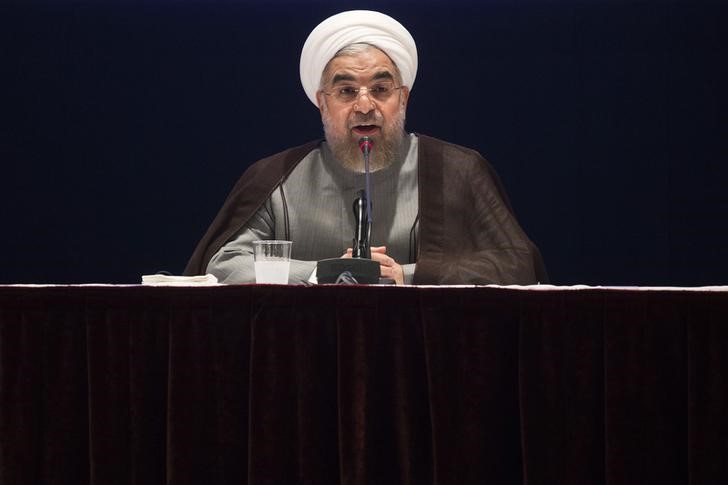By Mehrdad Balali
DUBAI (Reuters) - A big oil price slide will hurt Iran's attempts to rescue battered living standards, but economic pain is unlikely to soften its stance in nuclear talks or end aid to allies such as Syria, matters seen by its ruling clerics as strategic priorities.
Economic misery due to sanctions and mismanagement has been a reality for years, and while social strains in the 76 million population are deep, the clerics will seek to contain them, say experts examining Iran's budget plans for 2015.
The largest drop in oil prices since the 2008 financial crisis means more budget pressure for the OPEC member, already bereft of tens of billions of dollars in oil revenue due to Western sanctions and years of economic mismanagement.
And tougher economic times may spur Tehran's determination to end a nuclear dispute and lift sanctions that isolate it from the global banking system and deter most foreign investors.
But significant changes in Iran's regional strategy including its approach to any nuclear deal are unlikely.
That is partly because funds for security affairs come from Supreme Leader Ayatollah Ali Khamenei, not the government. He also decides nuclear policy.
"Our support to our brother Assad will never change," said a senior Iranian official, referring to Syrian President Bashar al-Assad. "Because of (declining) oil prices we face economic hardship ... but we will mange to continue our support to Syria, militarily and financially."
Ali Vaez, of the International Crisis Group think-tank, said the oil price fall would hurt, but was unlikely to make Iran accept a nuclear deal "that it views as lopsided".
"Iran's support for its allies in Iraq and Syria is not a questions of means, it's a strategic necessity. This is why neither the fall of the rial in 2012 or economic malaise in 2013 affected Iran's support for its Syrian and Iraqi allies."
Iran and world powers are negotiating to end a standoff over Tehran's nuclear goals. Tehran denies Western charges it is seeking nuclear weapons.
President Hassan Rouhani presented a "cautious, tight" budget on Dec. 7 in response to falling oil prices, now almost $10 a barrel below the $70 his budget was based on.
Spending was six percent above this year, a real terms cut due to inflation of 20 percent.
But with revenues pressured, plans to hike defense spending 33 percent prompted speculation that Rouhani wants to placate security hardliners, hoping they will indulge his bid to win a nuclear deal and end sanctions.
POWERFUL HAWKS
Powerful anti-Western hawks in the Islamic Revolutionary Guards Corps (IRGC), who report to Khamenei, have been wary of the negotiations.
They have tolerated the talks, diplomats speculate, largely because his big 2013 election win revealed the depth of anger over economic mismanagement and support for his aim of ending Iran's international isolation.
Mehrdad Emadi of Betamatrix International Consultancy suggested Rouhani had to consider the IRGC in setting economic policy because it could spoil any nuclear deal.
Greater defense spending was aimed at "giving them a big piece of the public pie so they can stop kicking up a fuss when it comes to negotiations, especially those with the Americans."
"The IRGC are extremely sensitive to any reduction of ‘military aid' to what they see as strategic allies."
The IRGC could ruin any rapprochement with the West it felt might hurt its interests.
Last year, Iran granted Syria a $3.6 billion credit facility to buy oil products, with another $1 billion for non-oil products.
Domestically the government has ways of mitigating the pain.
One is gradual depreciation of the official exchange rate at which it converts oil revenues from dollars into rials. This allows a progressively smaller amount of dollars to supply the same rial revenues.
The central bank's official exchange has dropped to 27,043 from 25,651 at the end of June and 24,774 at the end of last year. Next year's budget is based on a rate of 28,500, showing the government plans to continue this strategy.
Meanwhile, the free-market price of the rial has stabilized at about 35,000, far from lows near 40,000 two years ago. That suggests most Iranians think that while cheaper oil will pressure the rial, they do not yet expect an economic collapse or a run on the currency.
Emadi said Rouhani would try to shield the poorest from spending cuts to avoid any repeat of the unrest that followed 2009's disputed presidential election.
A 30 percent rise in bread prices on Dec. 1 rattled Iranians, but there was no major unrest. Emadi said the government later took steps to compensate poorer households.
There could be further subsidy cuts but open protest was unlikely since "the regime's machinery of repression still makes this very risky", said Scott Lucas of EA WorldView, a specialist website on Iran and Syria.
(Additional reporting by Parisa Hafezi, Andrew Torchia and William Maclean; Editing by Giles Elgood)
